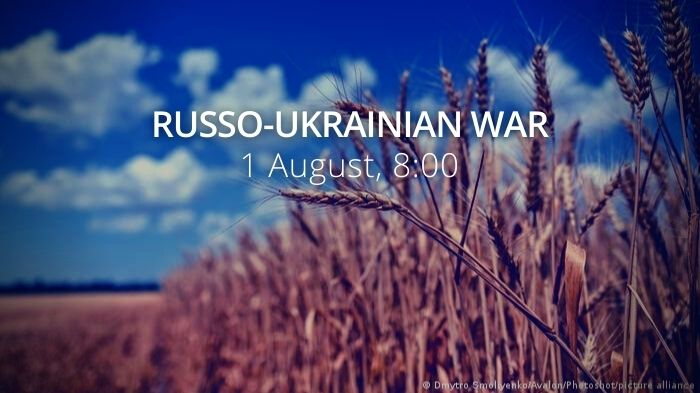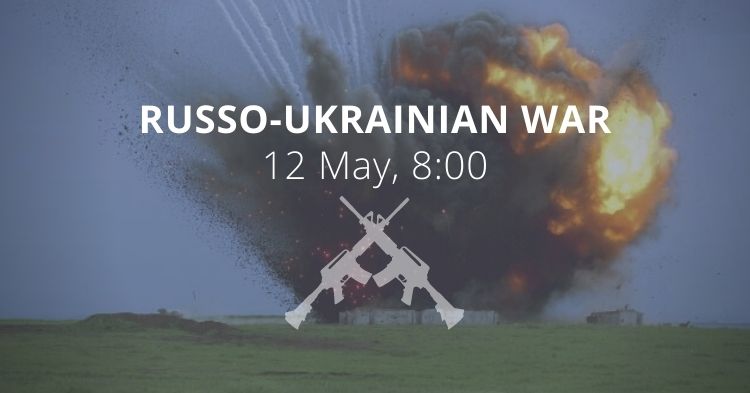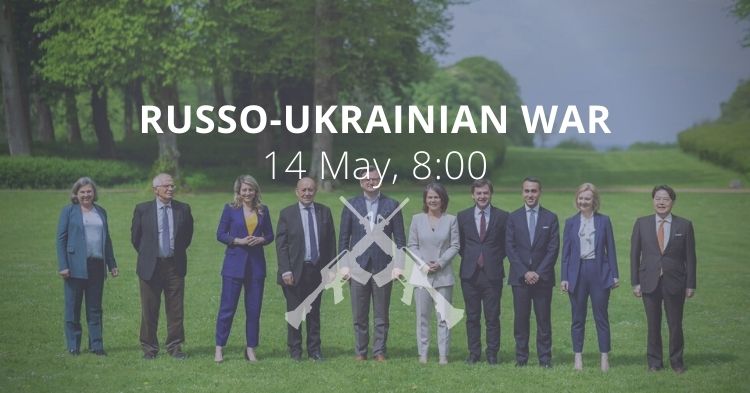Russia deprioritizes the Bakhmut offensive in favor of preparing for a Ukrainian counteroffensive-ISW. European Council approves €1 billion ammunition support for Ukraine. Ukraine could have intercepted a Russian Kinzhal missile for the first time.
Sofiya, 11, and her brother Kyrylo, 17, were killed during a Russian missile attack on Uman, Cherkasy Oblast, on April 28, 2023
In the photo, a little boy is crying at the funeral of his brother and sister
Photo by Carlos Barria pic.twitter.com/3AezmXb6pO
— Euromaidan Press (@EuromaidanPress) May 5, 2023
Daily overview — Summary report, May 6
A map of the approximate situation on the ground in Ukraine as of 00:00 UTC 06/05/23. pic.twitter.com/QiCsA7qPAK
— War Mapper (@War_Mapper) May 6, 2023
The General Staff’s operational update regarding the Russian invasion as of 18.00 pm, May 6, 2023 is in the dropdown menu below:
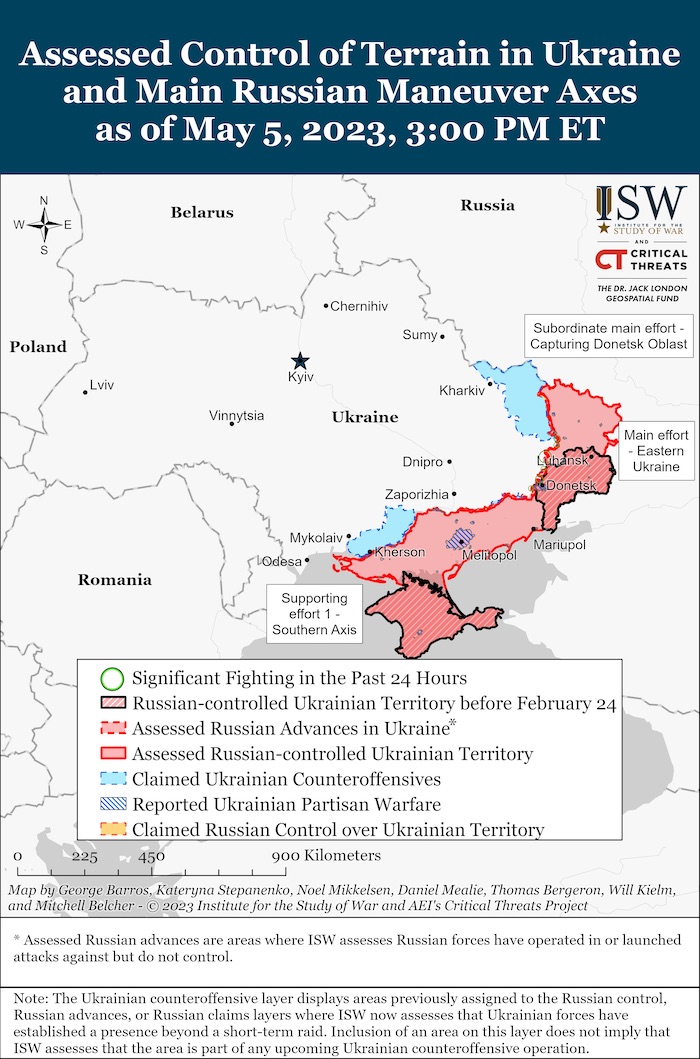
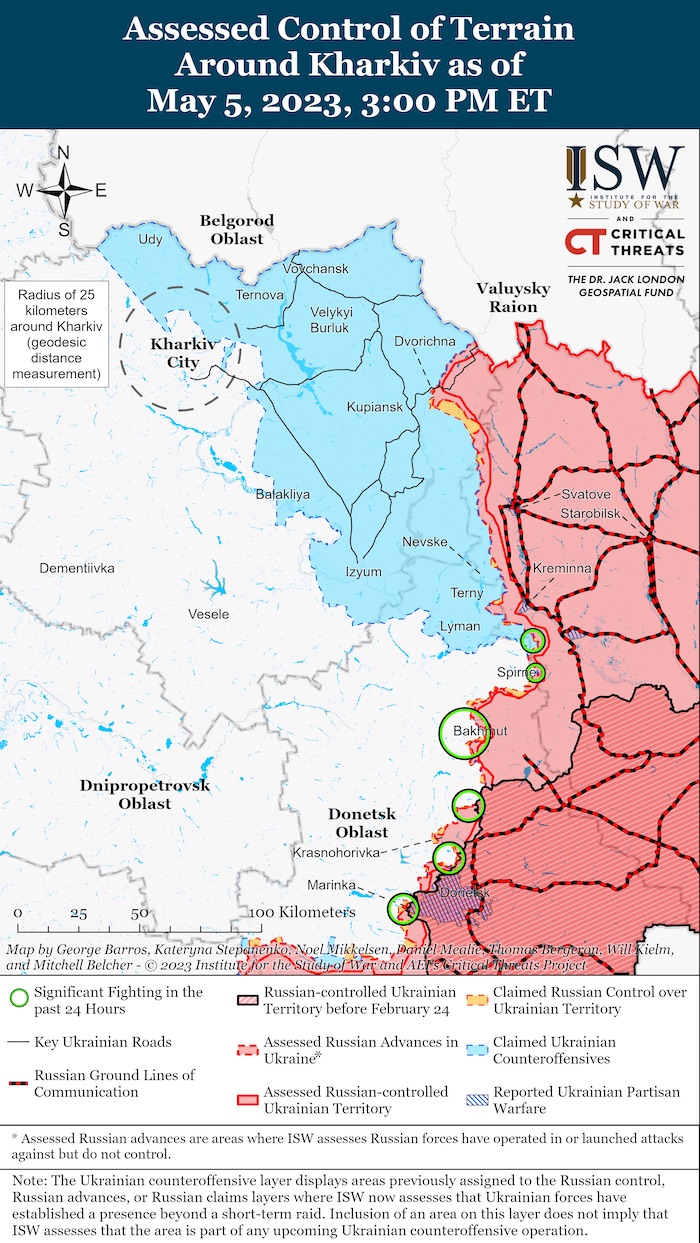
In the Kupiansk direction, Bolohivka, Krasne Pershe, Figolivka, Novomlynsk, Dvorichna, Lyman Pershi, Pischane and Stelmakhivka of the Kharkiv region were hit by enemy artillery and mortar fire.
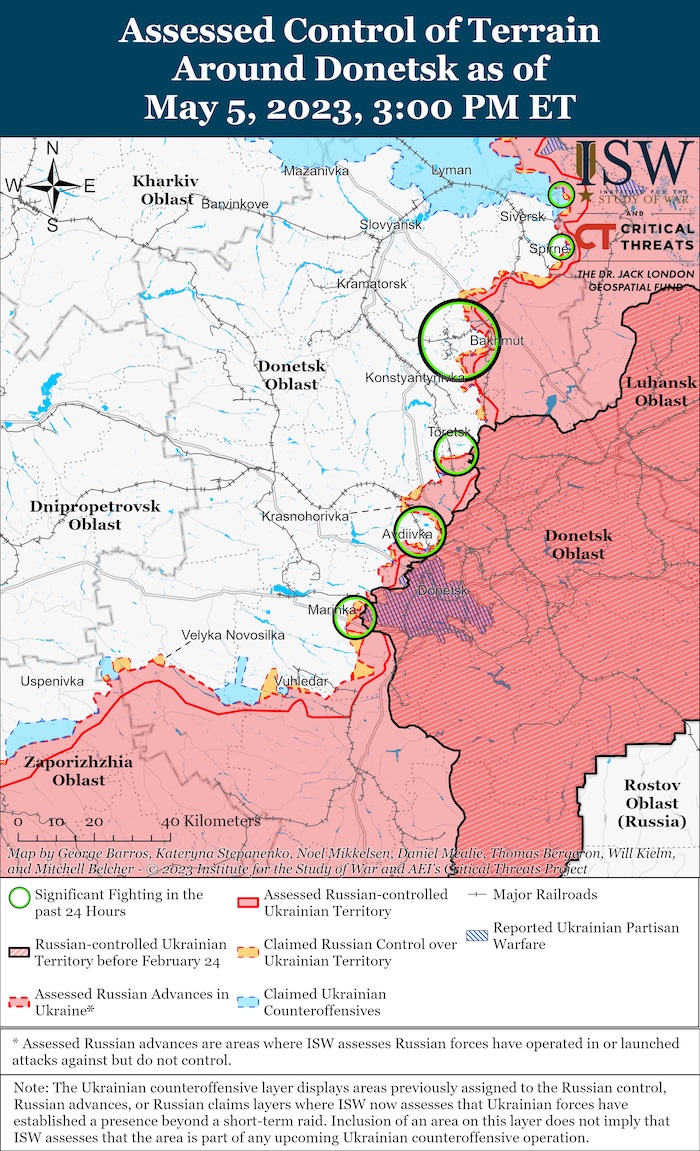
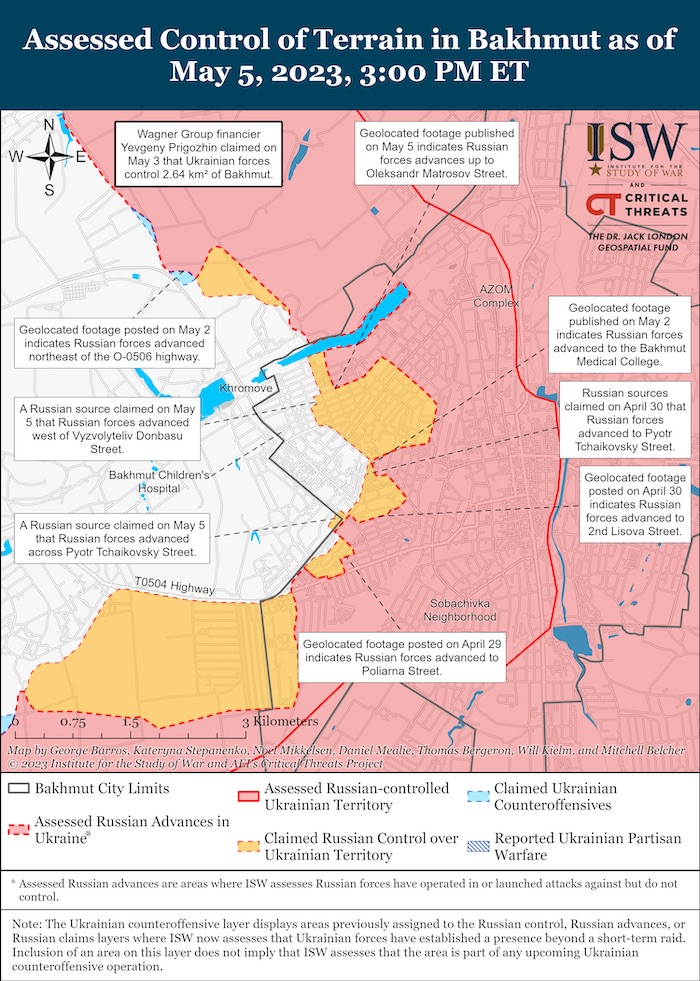
In the Marinka direction, during the past day, our soldiers repelled attacks in the Marinka area. Kurakhove, Georgiyivka, Pobyeda, Elizavetivka, Katerynivka and Novomykhailivka of the Donetsk region also came under enemy fire.
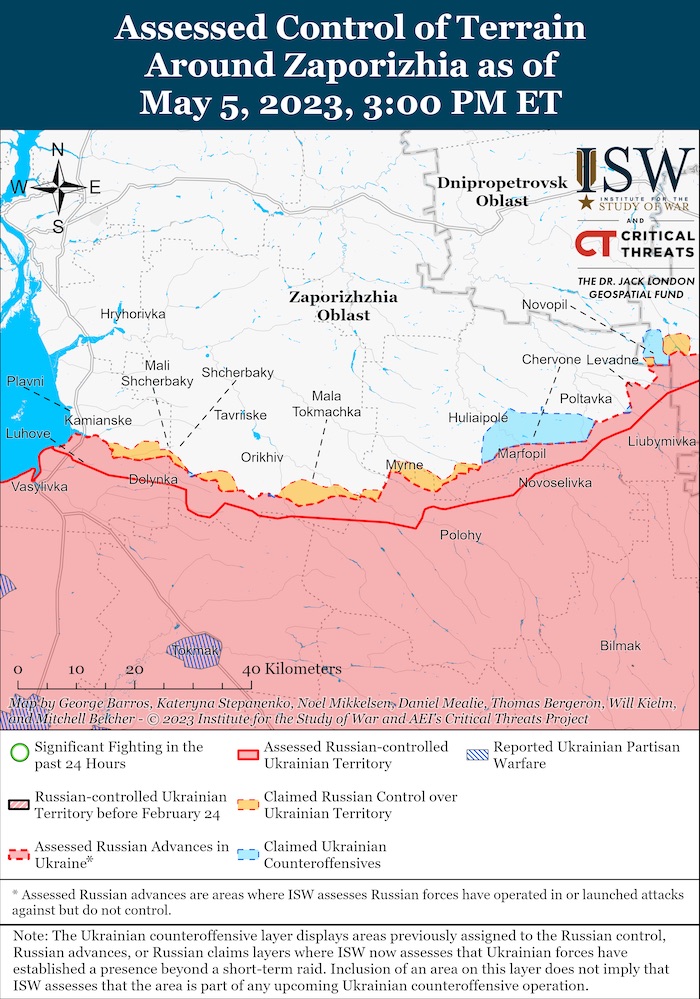
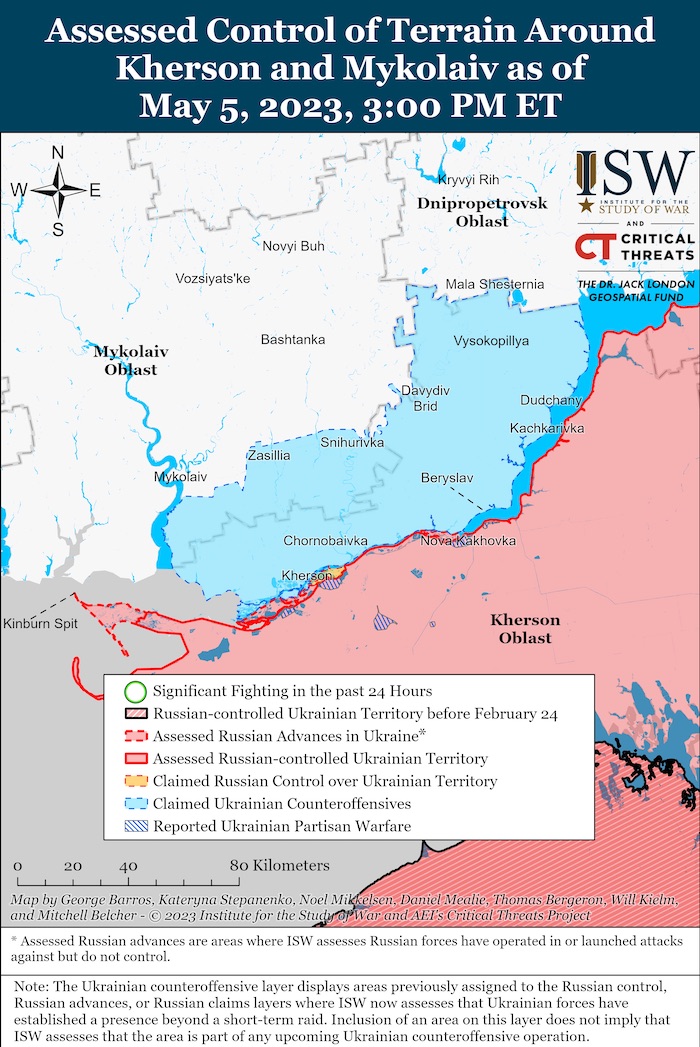
Military Updates
https://twitter.com/EuromaidanPress/status/1654505124344082432
S-300 missiles hit buildings in Sloviansk and Kramatorsk amid air alert. Following a large-scale air alert announced in all regions of Ukraine except for the western ones, in Sloviansk, 2 S-300 missiles hit a building of Zeus Ceramics factory; in Kramatorsk, an administrative building of NKMZ [machine-building plant] was damaged, Donetsk Oblast Head Pavlo Kyrylenko reported. “According to preliminary reports, there were no casualties,” he added.
Ukrainian forces destroy Wagner PMC ammunition sites in Bakhmut. The Ukrainian Armed Forces have successfully destroyed ammunition storage sites belonging to the Wagner Private Military Company (PMC) members in the Bakhmut direction. The news was reported by Deputy Minister of Defense Hanna Maliar. Maliar previously informed that the enemy was attempting to take control of Bakhmut by May 9th, deploying Wagner PMC mercenaries from other directions for this purpose.
Ukraine trained 10,000 drone pilots within "Army of drones" project
According to the country's Minister of Digital Transformation, the project has also supplied thousands of drones for the military, & transforms UAV doctrine https://t.co/qomg42Gmi9 pic.twitter.com/BgzbT5f0tn
— Euromaidan Press (@EuromaidanPress) May 5, 2023
Ukraine trains 10,000 drone pilots within “Army of drones” project. Ukraine has successfully trained 10,000 drone pilots as part of its “Army of Drones” project, said Mykhailo Fedorov, the country’s Minister of Digital Transformation. Fedorov announced the accomplishment on TV air. The “Army of Drones” project, initiated by the General Staff of the Ukrainian Armed Forces and the Ministry of Digital Transformation, is a comprehensive program aimed at the systematic procurement of drones, their repair, and training relevant specialists. The project began on 1 July 2022 under the motto: “Not people but drones should fight.”
Ukraine successfully intercepted Russian Kinzhal missile for the first time
Defense Express obtained photos of the missile fragments, which confirmed the missile was Kinzhal. Ukrainian air defense couldn't intercept Kinzhals until reinforced with Patriots https://t.co/u8FaqXXrCv pic.twitter.com/JR5gUYZEOg
— Euromaidan Press (@EuromaidanPress) May 5, 2023
Ukraine could have intercepted a Russian Kinzhal missile for the first time. The Ukrainian Armed Forces successfully intercepted a Russian ballistic missile, the so-called “hypersonic” Kinzhal over Kyiv at around 2:40 am on May 4th., Defense Express wrote, showing the obtained photos of the missile fragments, which fell on a stadium within the city limits, which confirms the missile was Kinzhal. This could be the first case Ukrainians intercepted missiles of this type. Ukrainian air defense didn’t have the capabilities to intercept these missiles until Patriot air defense systems reinforced it.
Russian oil refinery reportedly attacked second time in two days. Russian Telegram channel Baza reported another explosion on the territory of the Ilskiy oil refinery in Russian Krasnodar krai, less than 200 km from Russian-occupied Crimea. “A drone attacked the Ilskiy Refinery at 8:30 a.m. Personnel evacuation is now underway,” Baza reported, sharing a video.
According to British Defence Intelligence, (last 48 hours):
- Six Russian regions, occupied Crimea, and 21 cities have cancelled their 09 May Victory Day parades citing security concerns. Victory Day commemorates the Soviet Union’s victory over Nazi Germany. Moscow's Victory Day celebration is likely to go ahead but on a smaller scale. Russian President Vladimir Putin’s reception following the parade (last held in 2019) will not go ahead.
- The traditional March of the Immortal Regiment, where family members display photographs of deceased veterans of the Second World War, associated with Victory Day, has also been cancelled. This follows the recent cancellation of the Russian-hosted International Army Games.
- The timing of the UAV strike on the Kremlin a few days before Victory Day shows Russia’s increasing vulnerability to such attacks and has almost certainly raised the threat perception of the Russian leadership over the Victory Day events.
The potential for protests and discontent over the Ukraine war are also likely to have influenced the calculus of the Russian leadership.
Losses of the Russian army
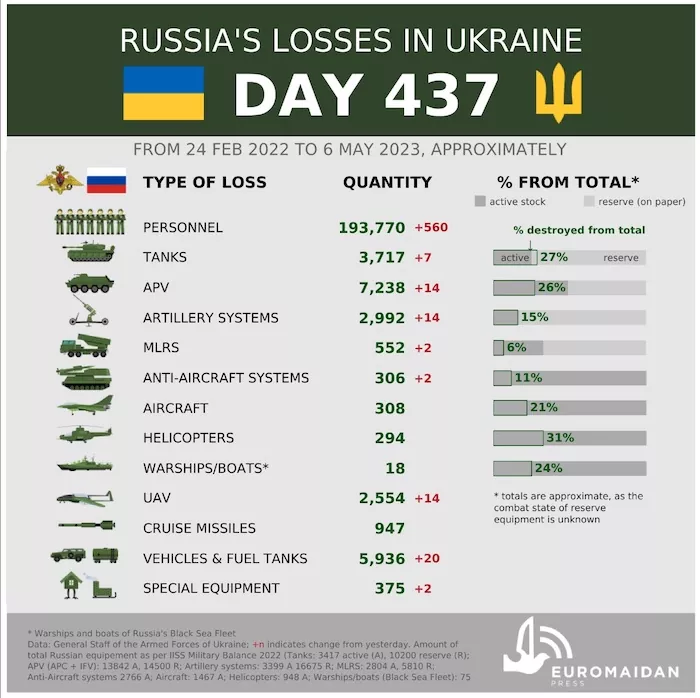
Humanitarian
Victims of deadliest Russian missile attack still coping with grief
Victims of deadliest Russian missile attack still coping with grief. Russia’s attack on a residential building in Dnipro, in January, killed 46 people and destroyed dozens of flats, having become the war’s deadliest missile strike. Two months later, the survivors of Building 118 still cope with physical and psychological wounds.
Legal
Ensuring that #Russia answers for its killing of children in #Uman, #Dnipro and other #warcrimes in #Ukraine#StandWithUkraine #RussiaWarCrimes #PutinWarCrimes #Mariupol #StopRussia #T4Phttps://t.co/ubfw22w0Au
— Euromaidan Press (@EuromaidanPress) May 5, 2023
Ensuring that Russia answers for its killing of children in Uman and countless other war crimes. Six children were among those killed in a Russian missile strike on an apartment block in Uman on 28 April. The Russians struck at around 4 a.m., killing at least 23 civilians in Uman (Cherkasy oblast), an important place of pilgrimage for Jews from all over the world, and a city hundreds of miles from the frontline. In a separate attack on a residential building in Dnipro, a 31-year-old mother was killed, together with her 2-year-old son. The death toll from these attacks on civilian targets would certainly have been higher had Ukraine not succeeded in intercepting most of the missiles.
Support
Rheinmetall plans to supply Ukraine with more artillery ammunition
Largest Western ammunition manufacturer with annual output of 450,000 shells aims to expand to 600,000-700,000 artillery rounds per year.Expansion efforts are estimated to take 1-1.5 years https://t.co/DG5SmeQpxC
— Euromaidan Press (@EuromaidanPress) May 5, 2023
Rheinmetall announced plans to produce up to 600-700 thousand rounds per year for Ukraine. German defense company Rheinmetall plans to provide a significant amount of artillery ammunition to Ukraine, with the capacity to deliver up to 600,000 rounds per year, according to CEO Armin Papperger, Handelsblatt reports. The announcement followed a visit from EU Industry Commissioner Thierry Breton to Rheinmetall’s factory in Unterlüß, Lower Saxony. The European Union has pledged to supply Ukraine with one million artillery shells annually to aid the country in defending against Russian aggression. However, the ammunition supply is running low due to intense fighting, prompting the EU to explore options to bridge the gap. Rheinmetall, already the largest Western ammunition manufacturer with an annual output of 450,000 shells, can expand its production to 600,000-700,000 artillery rounds per year.
European Council adopted €1 billion to Ukraine under European Peace Facility
It will fund provision of 155mm artillery rounds & missiles, which will be jointly procured by EU member states. It brings the total EU military support to Ukraine to €5.6 bn https://t.co/A9ncNVEjSY pic.twitter.com/wi7cPpBxgi
— Euromaidan Press (@EuromaidanPress) May 5, 2023
European Council approves €1 billion ammunition support for Ukraine. The European Council adopted a €1 billion assistance measure under the European Peace Facility (EPF) to further strengthen Ukraine’s capabilities and resilience in defending its independence, sovereignty, territorial integrity, and protecting civilians from ongoing Russian military aggression. This measure will fund the provision of 155-mm-caliber artillery rounds and, if requested, missiles to the Ukrainian Armed Forces, which will be jointly procured by EU member states from the European defense industry. First radars, for which Lithuanians crowdfunded EUR 14mn, arrived in Ukraine. On 4 May 2023, the first three radars ordered from donations of Lithuanian residents in February were delivered to Ukraine. In total, as the “Blue/Yellow” organization reported 16 radars were ordered for 14 million euros crowdfunded by Lithuanians during the project Radarom.
Ukraine’s “Come Back Alive” fund unveils secret project supporting Ukrainian Intelligence. Ukraine’s largest fund supporting the army, “Come Back Alive,” revealed today a secret project for the Main Intelligence Directorate of the Ministry of Defense of Ukraine.
Ukraine's Come Back Alive fund unveiled secret project supporting Ukrainian Intelligence, which they used to name "black box" for almost a year.
Head of Ukraine's Intelligence thanked Ukrainians who donated $1.1 million for mobile intelligence station.https://t.co/45caVWzS9Q pic.twitter.com/QJQ7SFqjGz
— Euromaidan Press (@EuromaidanPress) May 5, 2023
New Developments
“NATO must offer Ukraine clear membership algorithm by end of 2023,” Ukraine Defense Minister says. Ukraine’s Defense Minister, Oleksiy Reznikov, hopes that the upcoming NATO summit in Vilnius in July will outline a clearer perspective on Ukraine’s membership and military support to end the war with Russia. Reznikov stated this in a video message to participants of a discussion within the Atlantic Council analytical center on Friday.
Estonian Foreign Minister meets NATO Secretary General to discuss Ukraine’s accession. Estonian Foreign Minister Margus Tsahkna meet with NATO Secretary General Jens Stoltenberg in Brussels on Friday. According to ERR radio news, one of the key topics to be discussed during the meeting will be Ukraine’s accession to NATO.
Zelenskyy met with Bahrain's FM, marking the first visit of a Bahraini FM to Ukraine
Zelenskyy thanked for support via UN voting, invited Bahrain to participate in UA Peace Formula& upcoming summit. Meeting also addressed forced deportation of UA children https://t.co/eTSlzFbmJS
— Euromaidan Press (@EuromaidanPress) May 5, 2023
Assessment
- On the war.
The Institute for the Study of War has made the following assessment as of May 5, 2022:
The Russian Ministry of Defense (MoD) appears to have deprioritized the Bakhmut offensive in favor of preparing to defend against an anticipated Ukrainian counteroffensive, putting the Wagner Group and Wagner financier Yevgeny Prigozhin in a potentially difficult position. Prigozhin released a series of videos on May 4 and 5 announcing that Wagner will withdraw from Bakhmut on May 10 unless Wagner receives necessary supplies and launched particularly acerbic and emotional attacks against Chief of the Russian General Staff Army General Valery Gerasimov, Russian Minister of Defense Sergei Shoigu, and the Russian MoD establishment writ large.[1] Prigozhin’s palpable desperation in the videos, one of which shows the corpses of recently deceased Wagner fighters, marks a significant rhetorical inflection in his continued pleas for increased Russian MoD support for Wagner in Bakhmut. His visible and visceral anger suggests that the Russian MoD has likely deprioritized Bakhmut and shifted operational focus elsewhere in the theater in ways that may seriously compromise Wagner’s ability to operate effectively. Wagner has not ceased efforts to completely capture Bakhmut despite reduced access to ammunition and other necessary supplies, however. Prigozhin has shown no willingness to switch to the defensive within the city.
Wagner’s continued persistence within Bakhmut is incongruent with the overall slow-down in the pace of Russian offensive operations elsewhere in Ukraine as conventional Russian forces appear to be largely shifting focus to prepare to receive the much-anticipated Ukrainian counteroffensive.[2] Aside from very limited and localized attacks in the Kreminna area and near Donetsk City, Russian forces have largely ceased offensive operations throughout the theater, likely signifying a transition to the defensive.[3] It would be an operationally sound decision for the Russian MoD to begin withholding and stockpiling ammunition and supplies in order to prepare for any Ukrainian counteroffensive actions, and Prigozhin’s desperate statements indicate that the Russian MoD is likely doing so. ISW has recently reported that Prigozhin began appealing to the Russian MoD to provide Wagner with necessary ammunition once again after a brief period during which it seemed that relations between Prigozhin and Russian military leadership had improved.[4] Prigozhin’s renewed anger reached its peak in the May 4 video of Prigozhin essentially screaming at Gerasimov and Shoigu and accusing them of the deaths of Wagner fighters.[5]
The losses suffered by Wagner in Bakhmut, alongside the likely de-prioritization of the Bakhmut effort by the Russian MoD, may leave Prigozhin and Wagner in a particularly bad spot. It is not immediately clear whether Prigozhin actually intends to withdraw from Bakhmut on May 10 or whether he made the announcement in a last-ditch attempt to secure MoD support. If Wagner does withdraw, then it will likely need Russian MoD equipment to protect and facilitate the retrograde. The Russian military lacks the reserves needed to man positions Wagner might abandon in Bakhmut, moreover. The massive losses suffered by Wagner in Bakhmut for the sake of tactical gains, as well as the overall shift of the Russian military towards a more cautious posture preparing for defensive operations, appears to be offering Ukrainian forces opportunities for fruitful counterattacks in various areas of the front. Ukrainian forces appear to be seizing some of these opportunities, as noted below, but ISW does not assess that these counterattacks are necessarily part of the anticipated counteroffensive. NB: ISW uses the term “counterattack” to describe tactical actions by Ukrainian forces to make limited gains in local areas. It uses the term “counteroffensive” to describe operational-level undertakings composed of many distinct tactical actions intended to achieve operationally or strategically significant gains. ISW has so far observed reporting only of Ukrainian counterattacks.
Recently dismissed former Deputy Minister of Defense for Logistics Colonel General Mikhail Mizintsev is reportedly serving as deputy commander of the Wagner Group, likely as part of Wagner’s campaign to retain access to Russian military supplies. A Wagner-affiliated Russian milblogger published footage on May 4 and 5 purporting to show Mizintsev acting as Wagner deputy commander and discussing logistical and tactical issues with Wagner fighters in the Bakhmut area.[6] Prigozhin publicly offered the command position to Mizintsev following his dismissal on April 27, and Prigozhin claimed on May 5 that Mizintsev in his capacity as head of logistics supplied Wagner with low quality ammunition.[7] Prigozhin may have appointed Mizintsev as Wagner deputy commander in an effort to leverage Mizintsev‘s understanding of and relationships within the Russian military’s logistics apparatus to retain access to ammunition and supplies amid an apparent reprioritization away from Wagner’s area of responsibility. Mizintsev was reportedly dismissed after Commander of the Russian Airborne Forces (VDV) Mikhail Teplinsky, a likely anti-Gerasimov figure, conducted readiness checks that revealed that the Russian Northern Fleet lacked supplies, possibly indicating that Mizintsev fell out of favor with both factions within the MoD and joined Wagner to retain a command role in Ukraine.[8] The changes likely occurring within the Russian military’s logistics apparatus associated with the reprioritization of supplies for defensive operations will likely impede Mizintsev‘s presumed efforts to retain Wagner’s access to supplies.
Russian Defense Minister Sergei Shoigu ordered newly-appointed Deputy Minister for Logistics Alexei Kuzmenkov to control the supply of weapons and equipment to Russian forces in Ukraine. The Russian Ministry of Defense (MoD) reported on May 5 that Shoigu gave Kuzmenkov the order during an inspection of forces and military equipment in the Southern Military District.[9] The Russian MoD reported that Kuzmenkov presented Shoigu with new tanks, armored fighting vehicles, and other equipment and claimed that Russian military-industrial enterprises have repaired equipment at a rate faster than that of equipment losses. Shoigu likely met with Kuzmenkov to accelerate the conservation and reprioritization of logistics and sustainment processes ahead of expected upcoming Ukrainian counteroffensive operations. Shoigu’s meeting with the new head for logistics amid Wagner’s attempt to retain access to the Russian military’s logistics apparatus further suggests that Wagner will struggle to maintain its current level of provisions from the MoD.
Russian occupation authorities announced the forced removal of 70,000 civilians in occupied Zaporizhzhia Oblast to areas deeper in the Russian-occupied rear under the guise of evacuations. Zaporizhzhia Oblast occupation Head Yevgeny Balitsky and Deputy Head Andriy Kozenko announced on May 5 that Russian authorities will conduct a partial evacuation of 70,000 Ukrainian civilians of vulnerable populations, including families with children, the disabled, and the elderly, from 18 settlements along the southern bank of the Kakhovka Reservoir and along Russian ground lines of communications (GLOCs) roughly 20-40 kilometers from the front line.[10] Kozenko claimed that authorities have already begun evacuating civilians from the Polohy Raion to Berdiansk.[11] The locations of these settlements so far from the current front lines suggest that Russian forces plan to conduct a controlled, fighting withdrawal from their current positions to a prepared line of defense rather than trying to hold the current line of contact in the event of a possible Ukrainian counteroffensive. Kherson Oblast occupation authorities had similarly used the guise of evacuation to justify the forced relocation of Ukrainians from the frontlines in Kherson Oblast during Ukraine’s counteroffensive in October and November 2022, citing threats of Ukrainian strikes and frontline hostilities.[12] These Russian preparations do not necessarily indicate that Ukrainian forces will attack in or prioritize this area. Russian and occupation authorities will likely capitalize on growing Russian fear over a prospective Ukrainian counteroffensive to justify further mass relocations of Ukrainian civilians.
The Russian Ministry of Internal Affairs (MVD) proposed a draft bill aimed at appealing to growing anti-migrant sentiments in Russia and supporting the Russian military’s efforts to recruit migrants. The MVD submitted a draft bill on May 5 that would allow employers to deprive migrant employees of their work permits and create expanded administrative supervision over the residence of foreign citizens in Russia.[13] The draft bill states that the administrative supervision regime is aimed at establishing the whereabouts of foreign citizens illegally staying in Russia, although a Russian source claimed that the measure will allow Russian officials and police to freely enter the homes of migrants.[14] The MVD added an explanatory note to the bill in which it argued that ”illegal migration is closely related to such negative phenomena as terrorism, extremism, human trafficking, [and] drug trafficking.”[15] The reasoning offered for the bill is similar to Russian Investigative Committee Head Alexander Bastrykin’s recent accusation that migrants destabilize Russia by importing terrorism and extremist ideologies.[16] The bill is reflective of growing domestic ramifications from the wide acceptance of the Kremlin’s ”Russification” ideology, which ISW previously assessed is increasingly manifesting itself in how Russian authorities and ultranationalists negatively portray ethnic minorities and migrants in Russia.[17] Russian officials also disproportionally focus recruitment efforts on migrant communities, and the bill could set conditions for Russian officials to leverage jeopardized migration statuses to coerce migrants into signing contracts with the Russian military.[18]
Russian Human Rights Council head Valery Fadeev reportedly stated that Russian authorities should regulate Telegram channels similarly to how Russia censors state-controlled media. Kremlin newswire TASS reported on May 5 that Fadeev called for Russian authorities to “analyze the activities of Telegram channels” to consider introducing legislation to regulate Telegram.[19] Russian First Deputy Chairman of the Civic Chamber on Media and Mass Communication Alexander Malkevich supported the regulation of Telegram channels claiming that traditional forms of media and “new media” should be on an equal footing because ”new media” has "only rights and no obligations." Fadeev’s support of Telegram censorship is also notable because prominent Russian milblogger Alexander Kots also serves on the Russian Human Rights Council. ISW has previously reported on efforts on the part of Russian authorities to stimulate self-censorship in the information space.[20]
Key Takeaways
- The Russian Ministry of Defense (MoD) appears to have deprioritized the Bakhmut offensive in favor of preparing to defend against an anticipated Ukrainian counteroffensive, putting the Wagner Group and Wagner financier Yevgeny Prigozhin in a potentially difficult position.
- Wagner’s continued persistence within Bakhmut is incongruent with the overall slow-down in the pace of Russian operations elsewhere in Ukraine as conventional Russian forces appear to largely be shifting focus to prepare to receive the much-anticipated Ukrainian counteroffensive.
- Recently dismissed former Deputy Minister of Defense for Logistics Colonel General Mikhail Mizintsev is reportedly serving as deputy commander of the Wagner Group, likely as part of Wagner’s campaign to retain access to Russian military supplies.
- Russian Defense Minister Sergei Shoigu ordered newly-appointed Deputy Minister for Logistics Alexei Kuzmenkov to control the supply of weapons and equipment to Russian forces in Ukraine.
- Russian occupation authorities announced the forced removal of 70,000 civilians in occupied Zaporizhzhia Oblast to areas deeper in the Russian-occupied rear under the guise of evacuations.
- The Russian Ministry of Internal Affairs (MVD) proposed a draft bill aimed at appealing to growing anti-migrant sentiments in Russia and supporting the Russian military’s efforts to recruit migrants.
- Russian Human Rights Council head Valery Fadeev reportedly stated that Russian authorities should regulate Telegram channels similarly to how Russia censors state-controlled media.
- Russian forces conducted ground attacks near Kreminna and Avdiivka and made marginal gains within Bakhmut.
- Russian milbloggers claimed that Ukrainian forces conducted limited counterattacks near Bakhmut.
- The Russian Federal Security Service (FSB) claimed it prevented a Ukrainian assassination attempt against an occupation deputy of the Zaporizhzhia Nuclear Power Plant (ZNPP) on May 5.
- Chechen Republic Head Ramzan Kadyrov continues his own personal force generation efforts aimed at securing Russian President Vladimir Putin’s favor.
- Russian occupation authorities continue measures to strengthen social control of occupied territories.



